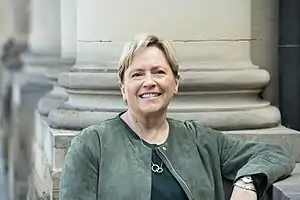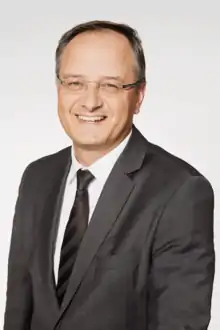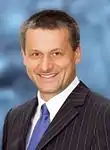2021 Baden-Württemberg state election
The 2021 Baden-Württemberg state election will be held on 14 March 2021 to elect the 17th Landtag of Baden-Württemberg.[1] The current government is coalition of Alliance 90/The Greens and the Christian Democratic Union led by Minister-President Winfried Kretschmann.
| ||||||||||||||||||||||||||||||||||||||||
All 120 seats in the Landtag of Baden-Württemberg (plus overhang and leveling seats) 61+ seats needed for a majority | ||||||||||||||||||||||||||||||||||||||||
|---|---|---|---|---|---|---|---|---|---|---|---|---|---|---|---|---|---|---|---|---|---|---|---|---|---|---|---|---|---|---|---|---|---|---|---|---|---|---|---|---|
| ||||||||||||||||||||||||||||||||||||||||
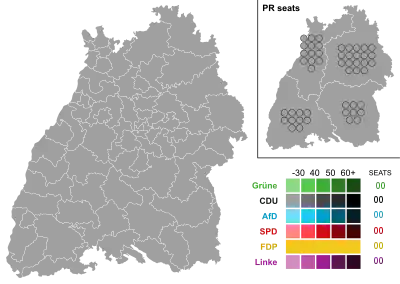 Constituencies to be contested in the election. | ||||||||||||||||||||||||||||||||||||||||
| ||||||||||||||||||||||||||||||||||||||||
Election date
The period of the 16th Landtag formally ends on 30 April 2021. The election of the 17th Landtag must take place before this date. On 24 March 2020, the state government designated 14 March 2021 as the date for the next election, in accordance with Section 19 of the State Parliament Election Act.[1]
Electoral system
The Landtag is elected via mixed-member proportional representation. 70 members are elected in single-member constituencies via first-past-the-post voting. 50 members are then allocated using compensatory proportional representation, distributed in each of Baden-Württemberg's four government districts. Unlike other states, Baden-Württemberg does not use party lists to fill proportional seats; instead, they are filled by the best-performing candidates who failed to be elected in the single-member constituencies. Candidates elected in this manner are listed as winning a "second mandate" (Zweitmandat) in the constituency in which they ran. The minimum size of the Landtag is 120 members, but if overhang seats are present, proportional leveling seats will be added to ensure proportionality. An electoral threshold of 5% of valid votes is applied to the Landtag; parties that fall below this threshold are excluded.[1]
Background
In the previous election held on 13 March 2016, The Greens became the largest party for the first time in any German state, winning 30.3% of votes cast. The CDU lost 12 percentage points, falling to second place on 27.0%. Alternative for Germany contested their first state election in Baden-Württemberg, placing third with 15.1%. The Social Democratic Party (SPD) lost almost half its voteshare and finished with 12.7%. The Free Democratic Party (FDP) won 8.3%.
The Greens had led a coalition with the SPD since 2011, but this government lost its majority in the election. The Greens subsequently formed a coalition with the CDU, which took office as Cabinet Kretschmann II.
Parties
The table below lists parties currently represented in the 16th Landtag of Baden-Württemberg.
| Name | Ideology | Lead candidate |
Leader(s) | 2016 result | |||
|---|---|---|---|---|---|---|---|
| Votes (%) | Seats | ||||||
| Grüne | Alliance 90/The Greens Bündnis 90/Die Grünen |
Green politics | Winfried Kretschmann | Sandra Detzer & Oliver Hildenbrand (co-leaders) Winfried Kretschmann (Minister-President) |
30.3% | 47 / 143 | |
| CDU | Christian Democratic Union of Germany Christlich Demokratische Union Deutschlands |
Christian democracy | Susanne Eisenmann | Thomas Strobl | 27.0% | 42 / 143 | |
| AfD | Alternative for Germany Alternative für Deutschland |
German nationalism Right-wing populism |
Bernd Gögel | Alice Weidel | 15.1% | 23 / 143 | |
| SPD | Social Democratic Party of Germany Sozialdemokratische Partei Deutschlands |
Social democracy | Andreas Stoch | Andreas Stoch | 12.7% | 19 / 143 | |
| FDP | Free Democratic Party Freie Demokratische Partei |
Classical liberalism | Hans-Ulrich Rülke | Michael Theurer | 8.3% | 12 / 143 | |
In addition to the parties already represented in the Landtag, ten other parties will contest the election:[2]
- The Left (DIE LINKE)
- Alliance C – Christians for Germany (Bündnis C)
- dieBasis – Grassroots Democracy Party of Germany (DieBasis)
- Die PARTEI
- FREE VOTERS (Freie Wähler)
- Climate List Baden-Württemberg (KlimalisteBW)
- Ecological Democratic Party/Family and Environment (ÖDP)
- Pirate Party Germany (Piraten)
- Volt Deutschland (Volt)
- WIR2020 (W2020)
Campaign
Lead candidates
On 29 May 2019, Susanne Eisenmann was confirmed as the CDU's lead candidate for the election. She currently serves as state Minister for Education, Youth, and Sports.[3]
On 12 September 2019, Winfried Kretschmann stated that he will stand as the lead candidate for The Greens in the 2021 election, seeking a third term as Minister-President.[4]
On 1 February 2020, state party leader Andreas Stoch was nominated as the SPD's lead candidate for the election.[5]
On 8 December 2019, the FDP state executive nominated Hans-Ulrich Rülke as their preferred lead candidate for the election. He was formally selected at a party conference in July 2020.[6] Rülke has served as leader of the FDP Landtag faction since 2009, and was the party's lead candidate in the 2016 election.[7]
In August 2020, AfD parliamentary group leader Bernd Gögel advocated against the selection of a lead candidate for the election. He stated that due to the party's position and the state's unusual electoral system, the lead candidate might fall short of election to the Landtag. "If the top candidate missed entry, that would be embarrassing."[8] In January 2021, Gögel defeated deputy parliamentary group leader Emil Sänze to become lead candidate after four rounds of voting in an online member survey.[9]
On 6 December 2020, The Left nominated state spokeswoman Sahra Mirow as their lead candidate for the election.[10]
Opinion polling
Party polling
| Polling firm | Fieldwork date | Sample size |
Grüne | CDU | AfD | SPD | FDP | Linke | Others | Lead |
|---|---|---|---|---|---|---|---|---|---|---|
| Forschungsgruppe Wahlen | 1–4 Feb 2021 | 1,032 | 34 | 28 | 11 | 10 | 9 | 3 | 5 | 6 |
| INSA | 5–11 Jan 2021 | 1,010 | 30 | 30 | 12 | 12 | 8 | 4 | 4 | Tie |
| Infratest dimap | 14–16 Dec 2020 | 1,001 | 35 | 30 | 11 | 10 | 7 | 3 | 4 | 5 |
| INSA | 10–16 Nov 2020 | 1,001 | 29 | 31 | 12 | 11 | 7 | 5 | 5 | 2 |
| Infratest dimap | 8–13 Oct 2020 | 1,001 | 34 | 29 | 11 | 11 | 6 | 4 | 5 | 5 |
| INSA | 2–9 Sep 2020 | 1,000 | 28 | 31 | 12 | 12 | 7 | 5 | 5 | 3 |
| Infratest dimap | 27–28 Apr 2020 | 1,003 | 34 | 30 | 12 | 11 | 6 | 3 | 4 | 4 |
| INSA | 15–20 Apr 2020 | 1,523 | 29 | 31 | 11 | 13 | 7 | 4 | 5 | 2 |
| Infratest dimap | 5–10 Mar 2020 | 1,001 | 36 | 23 | 14 | 11 | 7 | 5 | 4 | 13 |
| INSA | 23–28 Oct 2019 | 1,036 | 30 | 27 | 13 | 11 | 9 | 4 | 6 | 3 |
| Infratest dimap | 16–17 Sep 2019 | 1,004 | 38 | 26 | 12 | 8 | 8 | 3 | 5 | 12 |
| INSA | 6–8 May 2019 | 1,040 | 28 | 27 | 12 | 11 | 10 | 6 | 6 | 1 |
| Infratest dimap | 20–26 Mar 2019 | 1,002 | 32 | 28 | 11 | 12 | 9 | 4 | 4 | 4 |
| INSA | 7–12 Feb 2019 | 1,006 | 29 | 27 | 12 | 13 | 9 | 5 | 5 | 2 |
| Forsa | 29 Jan–1 Feb 2019 | 1,007 | 33 | 23 | 13 | 9 | 9 | 6 | 7 | 10 |
| Infratest dimap | 5–10 Sep 2018 | 1,003 | 29 | 28 | 15 | 11 | 7 | 7 | 3 | 1 |
| INSA | 1–6 Sep 2018 | 1,046 | 27 | 25 | 18 | 12 | 9 | 5 | 4 | 2 |
| Forsa | 8–22 Feb 2018 | 1,003 | 32 | 27 | 12 | 12 | 9 | 4 | 4 | 5 |
| Infratest dimap | 26–30 Jan 2018 | 1,003 | 29 | 29 | 12 | 12 | 8 | 6 | 4 | Tie |
| Infratest dimap | 3–7 Mar 2017 | 1,004 | 27 | 28 | 11 | 20 | 7 | 4 | 3 | 1 |
| Infratest dimap | 9–13 Sep 2016 | 1,001 | 31 | 26 | 17 | 13 | 7 | 3 | 3 | 5 |
| 2016 state election | 13 Mar 2016 | – | 30.3 | 27.0 | 15.1 | 12.7 | 8.3 | 2.9 | 3.7 | 3.3 |
Minister-President polling
| Polling firm | Fieldwork date | Sample size |
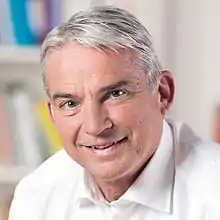 |
None/Unsure | Lead | ||
|---|---|---|---|---|---|---|---|
| Kretschmann Grüne |
Strobl CDU |
Eisenmann CDU | |||||
| Infratest dimap | 16–17 Sep 2019 | 1,004 | 69 | – | 13 | 9 | 56 |
| Infratest dimap | 20–26 Mar 2019 | 1,002 | 63 | 17 | – | 12 | 46 |
| Forsa | 29 Jan–1 Feb 2019 | 1,007 | 59 | 5 | – | – | 54 |
| Infratest dimap | 5–10 Sep 2018 | 1,003 | 67 | 14 | – | 10 | 53 |
Notes
References
- "Which parties are standing for election?". Baden-Württemberg State Returning Officer. 22 January 2021.
- "Volle Understützung für Eisenmann". Tagblatt.de. 29 May 2019.
- "Winfried Kretschmann will bei Landtagswahl 2021 erneut antreten". Spiegel Online. 12 September 2019.
- "Stoch soll Südwest-SPD in Landtagswahl 2021 führen". stimme.de. 1 February 2020.
- "Group leader Rülke leads the southwest FDP in state elections". Schwäbische Zeitung. 18 July 2020.
- "Baden-Württemberg: FDP-Vorstand für Rülke als Spitzenkandidat für Landtagswahl". n-tv.de. 8 December 2019.
- "Gögel against the creation of an AfD top candidate". N-tv.de. 18 August 2020.
- "AfD has chosen Gögel as the top candidate in the fourth attempt". N-tv.de. 31 January 2021.
- "Sahra Mirow nominated as the top candidate of The Left". Rhein-Neckar-Zeitung. 6 December 2020.
.jpg.webp)
